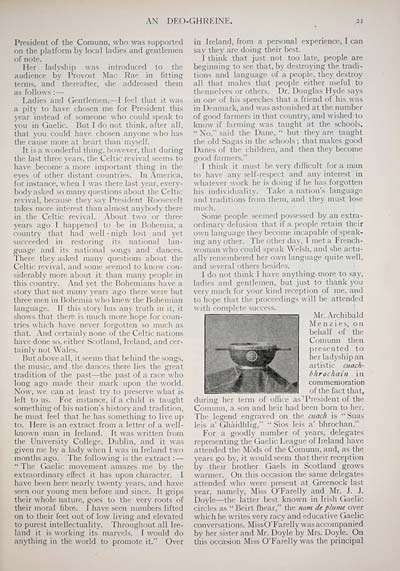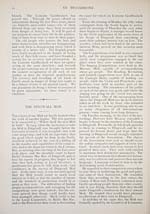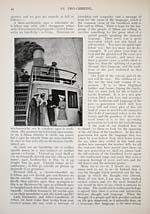Blair Collection > Deo-gréine
(37)
Download files
Complete book:
Individual page:
Thumbnail gallery: Grid view | List view

AN DEO-GHRKINT.
President of the Comunn, who was supported
on the platform by local ladies and gentlemen
of note.
Her ladyship was introduced to the
audience by Provost Mac Rae in fitting
terms, and thereafter, she addressed them
as follows : —
Ladies and Gentlemen, — I feel that it was
a pity to have chosen me for President this
year instead of someone who could speak to
you in Gaelic. But I do not think, after all,
that you could have chosen anyone who has
the cause more at heart than myself.
It is a wonderful thing, however, that during
the last three years, the Celtic revival seems to
have become a more important thing in the
eyes of other distant countries. In America,
for instance, when I was there last year, every-
body asked so many questions about the Celtic
revival, because they say President Roosevelt
takes more interest than almost anybody there
in the Celtic revival. About two or three
years ago I happened to be in Bohemia, a
country that had well - nigh lost and yet
succeeded in restoring its national lan-
guage and its national songs and dances.
There they asked many questions about the
Celtic revival, and some seemed to know con-
siderably more about it than many people in
this country. And yet the Bohemians have a
story that not many years ago there were but
three men in Bohemia who knew the Bohemian
language. If this story has any truth in it, it
shows that there is much more hope for coun-
tries which have never forgotten so much as
that. And certainly none of the Celtic nations
have done so, either Scotland, Ireland, and cer-
tainly not Wales.
But above all, it seems that behind the songs,
the music, and the dances there lies the great
tradition of the past — the past of a race who
long ago made their mark upon the world.
Now, we can at least try to preserve what is
left to us. For instance, if a child is taught
something of his nation's history and tradition,
he must feel that he has something to live up
to. Here is an extract from a letter of a well-
known man in Ireland. It was written from
the University College, Dublin, and it was
given me by a lady when I was in Ireland two
months ago. The following is the extract : — ■
" The Gaelic movement amazes me by the
extraordinary effect it has upon character. I
have been here nearly twenty years, and have
seen our young men before and since. It grips
their whole nature, goes to the very roots of
their moral fibre. I have seen numbers lifted
on to their feet out of low living and elevated
to purest intellectuality. Throughout all Ire-
land it is working its marvels. I would do
anything in the world to promote it." Over
in Ireland, from a personal experience, I can
sav they are doing their best.
Ì think that just not too late, people are
beginning to see that, by destroying the tradi-
tions and language of a people, they destroy
all that makes that people either useful to
themselves or others. Dr. Douglas Hyde says
in one of his speeches that a friend of his was
in Denmark, and was astonished at the number
of good farmers in that country, and wished to
know if farming was taught at the schools.
" No," said the Dane, " but they are taught
the old Sagas in the schools ; that makes good
Danes of the children, and then they become
good farmers."
I think it must be very difficult for a man
to have any self-respect and any interest in
whatever work he is doing if he has forgotten
his individuality. Take a nation's language
and traditions from them, and they must lose
much.
Some people seemed possessed by an extra-
ordinary delusion that if a people retain their
own language they become incapable of speak-
ing any other. The other day, I met a French-
woman who could speak Welsh, and she actu-
ally remembered her own language quite well,
and several others besides.
I do not think I have anything more to say,
ladies and gentlemen, but just to thank you
very much for your kind reception of me, and
ti i hi ipe that the proceedings will be attended
\\ Lth complete success.
Mr. Archibald
Menzies, on
behalf of the
Comunn then
presented to
her ladyship an
artistic cuach-
bhrochain in
commemoration
of the fact that,
during her term of office as 'President of the
Comunn, a son and heir had been born to her.
The legend engraved on the cuach is " Suas
leis a' Ghàidhlig," " Sios leis a' bhrochan."
For a goodly number of years, delegates
representing the Gaelic League of Ireland have
attended the Mods of the Comunn, and, as the
years go by, it would seem that their reception
by their brother Gaels in Scotland grows
warmer. _ On this occasion the same delegates
attended who were present at Greenock last
year, namely, Miss O'Farelly and Mr. J. J.
Doyle — the latter best known in Irish Gaelic
circles as " Beirt fhear," the nom de plutne over
which he writes very racy and educative Gaelic
conversations. MissO'Farelly was accompanied
by her sister and Mr. Doyle by Mrs. Doyle. On
this occasion Miss O'Farelly was the principal
President of the Comunn, who was supported
on the platform by local ladies and gentlemen
of note.
Her ladyship was introduced to the
audience by Provost Mac Rae in fitting
terms, and thereafter, she addressed them
as follows : —
Ladies and Gentlemen, — I feel that it was
a pity to have chosen me for President this
year instead of someone who could speak to
you in Gaelic. But I do not think, after all,
that you could have chosen anyone who has
the cause more at heart than myself.
It is a wonderful thing, however, that during
the last three years, the Celtic revival seems to
have become a more important thing in the
eyes of other distant countries. In America,
for instance, when I was there last year, every-
body asked so many questions about the Celtic
revival, because they say President Roosevelt
takes more interest than almost anybody there
in the Celtic revival. About two or three
years ago I happened to be in Bohemia, a
country that had well - nigh lost and yet
succeeded in restoring its national lan-
guage and its national songs and dances.
There they asked many questions about the
Celtic revival, and some seemed to know con-
siderably more about it than many people in
this country. And yet the Bohemians have a
story that not many years ago there were but
three men in Bohemia who knew the Bohemian
language. If this story has any truth in it, it
shows that there is much more hope for coun-
tries which have never forgotten so much as
that. And certainly none of the Celtic nations
have done so, either Scotland, Ireland, and cer-
tainly not Wales.
But above all, it seems that behind the songs,
the music, and the dances there lies the great
tradition of the past — the past of a race who
long ago made their mark upon the world.
Now, we can at least try to preserve what is
left to us. For instance, if a child is taught
something of his nation's history and tradition,
he must feel that he has something to live up
to. Here is an extract from a letter of a well-
known man in Ireland. It was written from
the University College, Dublin, and it was
given me by a lady when I was in Ireland two
months ago. The following is the extract : — ■
" The Gaelic movement amazes me by the
extraordinary effect it has upon character. I
have been here nearly twenty years, and have
seen our young men before and since. It grips
their whole nature, goes to the very roots of
their moral fibre. I have seen numbers lifted
on to their feet out of low living and elevated
to purest intellectuality. Throughout all Ire-
land it is working its marvels. I would do
anything in the world to promote it." Over
in Ireland, from a personal experience, I can
sav they are doing their best.
Ì think that just not too late, people are
beginning to see that, by destroying the tradi-
tions and language of a people, they destroy
all that makes that people either useful to
themselves or others. Dr. Douglas Hyde says
in one of his speeches that a friend of his was
in Denmark, and was astonished at the number
of good farmers in that country, and wished to
know if farming was taught at the schools.
" No," said the Dane, " but they are taught
the old Sagas in the schools ; that makes good
Danes of the children, and then they become
good farmers."
I think it must be very difficult for a man
to have any self-respect and any interest in
whatever work he is doing if he has forgotten
his individuality. Take a nation's language
and traditions from them, and they must lose
much.
Some people seemed possessed by an extra-
ordinary delusion that if a people retain their
own language they become incapable of speak-
ing any other. The other day, I met a French-
woman who could speak Welsh, and she actu-
ally remembered her own language quite well,
and several others besides.
I do not think I have anything more to say,
ladies and gentlemen, but just to thank you
very much for your kind reception of me, and
ti i hi ipe that the proceedings will be attended
\\ Lth complete success.
Mr. Archibald
Menzies, on
behalf of the
Comunn then
presented to
her ladyship an
artistic cuach-
bhrochain in
commemoration
of the fact that,
during her term of office as 'President of the
Comunn, a son and heir had been born to her.
The legend engraved on the cuach is " Suas
leis a' Ghàidhlig," " Sios leis a' bhrochan."
For a goodly number of years, delegates
representing the Gaelic League of Ireland have
attended the Mods of the Comunn, and, as the
years go by, it would seem that their reception
by their brother Gaels in Scotland grows
warmer. _ On this occasion the same delegates
attended who were present at Greenock last
year, namely, Miss O'Farelly and Mr. J. J.
Doyle — the latter best known in Irish Gaelic
circles as " Beirt fhear," the nom de plutne over
which he writes very racy and educative Gaelic
conversations. MissO'Farelly was accompanied
by her sister and Mr. Doyle by Mrs. Doyle. On
this occasion Miss O'Farelly was the principal
Set display mode to: Large image | Transcription
Images and transcriptions on this page, including medium image downloads, may be used under the Creative Commons Attribution 4.0 International Licence unless otherwise stated. ![]()
| Early Gaelic Book Collections > Blair Collection > Deo-gréine > (37) |
|---|
| Permanent URL | https://digital.nls.uk/76698100 |
|---|
| Description | A selection of books from a collection of more than 500 titles, mostly on religious and literary topics. Also includes some material dealing with other Celtic languages and societies. Collection created towards the end of the 19th century by Lady Evelyn Stewart Murray. |
|---|
| Description | Selected items from five 'Special and Named Printed Collections'. Includes books in Gaelic and other Celtic languages, works about the Gaels, their languages, literature, culture and history. |
|---|

